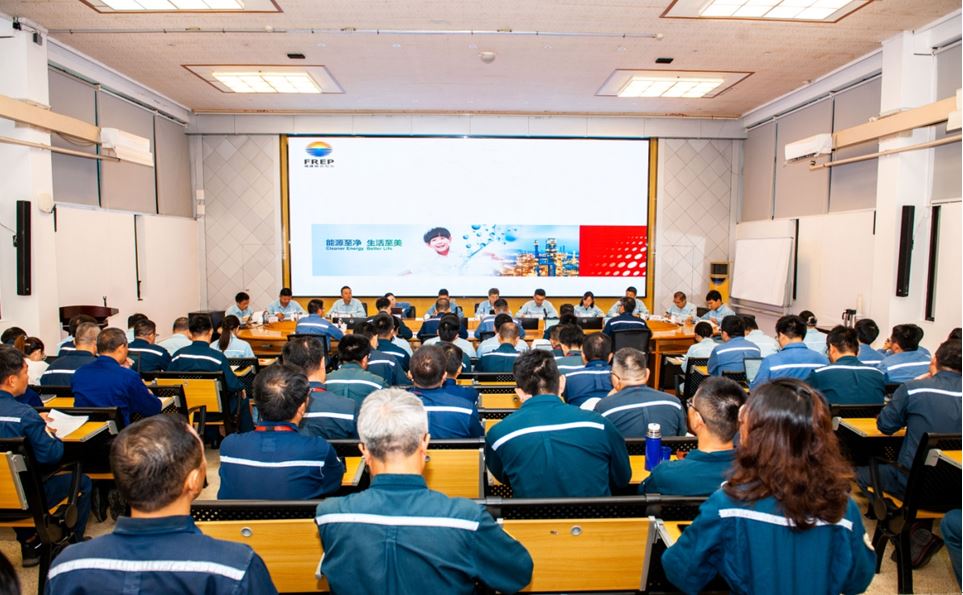锚定问题闭环 筑牢安全根基 ——中国石化HSE大检查暨管理体系审核组来公司检查
Anchoring a Closed-Loop Approach to Solving Problems to Fortify Safety Foundations
—Sinopec Group HSE Inspection and Management System Audit Team Conducted an Inspection at the Company
From October 13 to 18, the seventh inspection team for the refining and chemical sector under Sinopec Group HSE Inspection Program came to FREP. Following the full process of “kickoff arrangements—comprehensive inspection—feedback and commenting”, the team carried out the HSE inspection and management system audit for 2025.
The inspection was led by team lead Quan Hongqi, Deputy General Manager of Sinopec Group’s Health, Safety, and Environment Management Department, and deputy team lead Cao Yunbo, Deputy General Manager of Sinopec Yangzi Petrochemical Company. Zhang Xiguo, Party Secretary and Chairman of the Company, Zhao Tianxing, General Manager of FPCL, FREP Acting President Lin Xu, and Vice Presidents Suchart Phowatthanasathian, Li Ji, and Haytham Zamzami attended the kickoff and feedback & commenting meetings respectively.
At the kickoff meeting on October 13, Quan Hongqi first highlighted the grim production safety situation faced by the Group Company, emphasizing that this inspection must focus on “key identifications”: identification of the fine integration practices and highlights out of FREP’s Sino-foreign joint venture management experience, identification of ways to address core operational safety challenges and identification of methods to eliminate blind spots where potential hazards exist, thereby setting a benchmark for HSE management in joint ventures.
Zhang Xiguo put forward “three requirements,” requiring all personnel to enhance ideological understanding and promote the transformation of safety management from “addressing symptoms” to “tackling root causes”; be fully cooperative during the inspection and put into place a closed-loop rectification mechanism; and ensure “both inspection and production proceed without disruption”, leveraging the inspection to elevate HSE performance capabilities for all.
Lin Xu made a statement in response to the inspection, pledging to shoulder the task of preparing for inspection as a “political duty”, comprehensively reinforcing accountability across the entire chain and driving rectifications throughout all processes, while cherishing the “expert consultation” opportunity to firmly uphold safety bottom lines. At the meeting, Li Ji also reported on the current status of the Company’s HSE management work.
After six days of thorough inspection, the inspection team completed the inspection with comprehensive coverage of six major disciplines—safety, processes, equipment, environmental protection, etc., through field inspections, document reviews, personnel interviews, and performance tests.
At the feedback & commenting meeting on October 18, the inspection team presented problems across various disciplines and proposed rectification recommendations. Quan Hongqi reiterated that the Company must enhance its “sense of responsibility and urgency” in HSE work, optimizing the management system by “clarifying leadership roles and division of responsibilities, improving the evaluation system, formulating appropriate standards, strengthening system assessments, and enhancing communication and exchanges.” This aims to achieve deep integration between the system and production and operation. He also urged FREP to “identify root causes from specific cases to broader contexts”, addressing weaknesses and establishing robust long-term mechanisms.
Zhao Tianxing pointed out that this inspection not only exposed specific potential hazards but also revealed gaps of the Company’s HSE management regarding “systematization and refinement.” He clarified that FPCL would exercise its “supervisory function,” tracking the entire rectification process and urging FREP to “address problems immediately upon discovery and implement corrective actions without delay,” while also drawing broader lessons to prevent recurrence of similar problems.
Lin Xu made a statement in response to the rectification, committing to implementing rectification requirements from a strategic perspective, strengthening the effectiveness of systems like OIMS and RS, identifying blind spots in environmental and health safety, and leveraging best practices from peer enterprises to integrate informatization with production and to comprehensively improve safety management of key equipment.
Heads of FREP’s all departments and business teams attended the meeting, ensuring inspection directives reached primary-level organizations and rectification responsibilities were reinforced at every level, as well as fortifying the safety and environmental safeguards for high-quality development. (Xiao Wanyuan, Zhang Lei)




